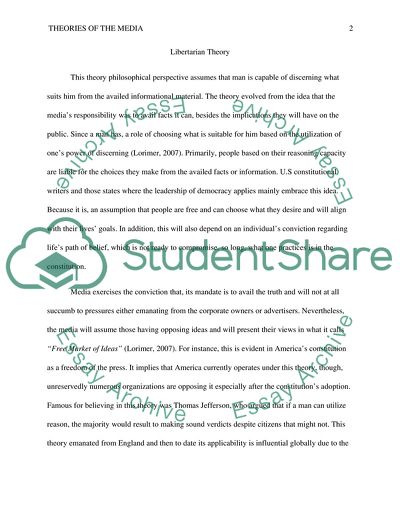Cite this document
(Theories of Media Essay Example | Topics and Well Written Essays - 1500 words, n.d.)
Theories of Media Essay Example | Topics and Well Written Essays - 1500 words. https://studentshare.org/media/1770282-compare-the-libertarian-social-responsibility-and-political-economic-theories-of-the-media-which-one-seems-to-provide-the-most-accurate-perspective-on-how-the-media-operate-on-our-society
Theories of Media Essay Example | Topics and Well Written Essays - 1500 words. https://studentshare.org/media/1770282-compare-the-libertarian-social-responsibility-and-political-economic-theories-of-the-media-which-one-seems-to-provide-the-most-accurate-perspective-on-how-the-media-operate-on-our-society
(Theories of Media Essay Example | Topics and Well Written Essays - 1500 Words)
Theories of Media Essay Example | Topics and Well Written Essays - 1500 Words. https://studentshare.org/media/1770282-compare-the-libertarian-social-responsibility-and-political-economic-theories-of-the-media-which-one-seems-to-provide-the-most-accurate-perspective-on-how-the-media-operate-on-our-society.
Theories of Media Essay Example | Topics and Well Written Essays - 1500 Words. https://studentshare.org/media/1770282-compare-the-libertarian-social-responsibility-and-political-economic-theories-of-the-media-which-one-seems-to-provide-the-most-accurate-perspective-on-how-the-media-operate-on-our-society.
“Theories of Media Essay Example | Topics and Well Written Essays - 1500 Words”. https://studentshare.org/media/1770282-compare-the-libertarian-social-responsibility-and-political-economic-theories-of-the-media-which-one-seems-to-provide-the-most-accurate-perspective-on-how-the-media-operate-on-our-society.


